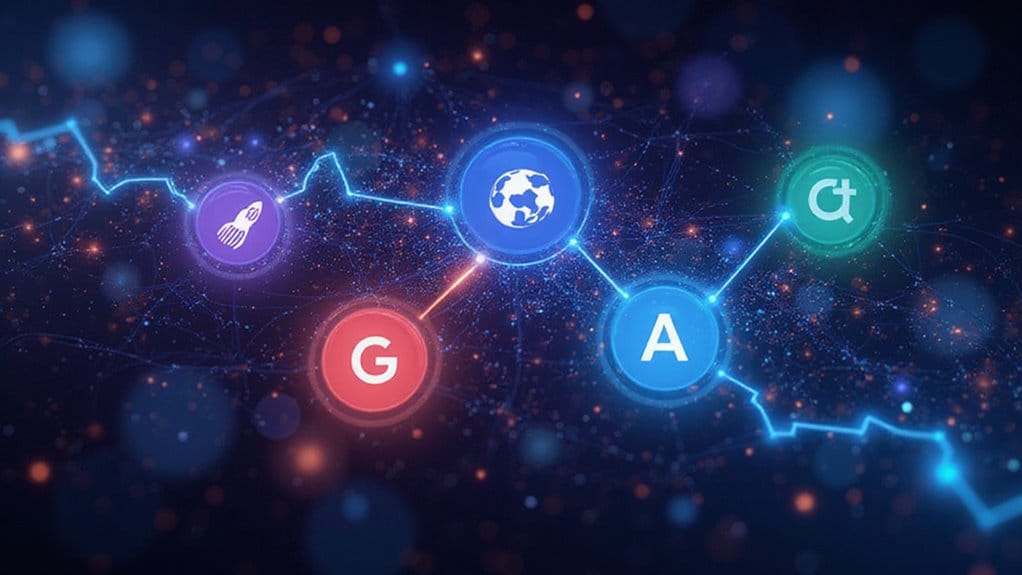Google AI Responses are not just fancy snippets; they are like your knowledgeable friend who knows exactly what you need. They summarize information from trustworthy sources, analyzing your questions to provide quick answers—often in a neat 157 words. This isn’t just for show; it transforms how you search! But beware, if creators want a piece of that visibility pie, quality content is key. Stick around, and you’ll uncover more about how this tech works under the hood.

When users type a question into Google, they’re often hoping for a quick answer, and that’s where Google AI Responses come into play. Imagine this: you ask Google something, and instead of sifting through endless pages of links, you get a neat little summary right at the top. That’s AI Response Dynamics!
These responses are crafted using advanced algorithms powered by Large Language Models (LLMs) like PaLM2, MUM, and Gemini. They’re designed to understand you—yes, you—by analyzing your query intent and user interaction.
Now, let’s break this down. First, Google’s AI dives into understanding what you’re really asking. Then, it selects trustworthy sources, ensuring you don’t end up with dubious information. Finally, it creates a concise summary, usually around 157 words, that’s easy to digest. Think of it as your personal assistant, ready to serve up facts without the fluff.
But wait, there’s more! The beauty of these AI Responses lies in their impact on SEO. If your content gets featured, congratulations! You just scored a prime spot above traditional search results. Who wouldn’t want that? AI Overviews fundamentally change the way users interact with search engines, making it essential for content creators to adapt their strategies. Sources mentioned in AI overviews average five per query, indicating the importance of diverse information. This transformation is driven by AI-generated summaries, which provide users with concise answers directly in search results.
But it’s not just luck; quality content is key. You need to write naturally, structure your information well, and, of course, sprinkle in those keywords like confetti.
And let’s not forget about the ongoing changes. AI technology is constantly evolving, bringing new features and capabilities. Users will soon have even more options, like simpler or more detailed summaries. So, get ready! Your search experience is about to transform.
In a world where quick access to information is king, Google AI Responses are the knights in shining armor. If you want to stay ahead, focus on providing clear, authoritative content. Because in this race for knowledge, you don’t want to be left in the dust.
Frequently Asked Questions
How Does Google AI Handle Ambiguous Queries?
Google AI tackles ambiguous queries through contextual interpretation, endeavoring to grasp user intent. It expands queries, uses standardized forms, and employs advanced models like BERT to clarify meanings.
Imagine a detective piecing together clues to solve a mystery—only here, it’s about your search! By analyzing various interpretations and their similarities, Google selects the most relevant results.
Can Google AI Learn From User Interactions?
Yes, Google AI can absolutely learn from user interactions.
It analyzes user feedback and interaction patterns to refine its responses. Think of it like a dog learning tricks; the more you engage, the smarter it gets!
So, if you want better search results, keep interacting! Just remember, your data is used to create a smoother experience, but always stay aware of privacy concerns.
Keep searching, and watch the AI evolve!
What Languages Does Google AI Support?
Google AI supports a plethora of languages—think Arabic, Chinese, and Spanish, just to name a few.
With impressive translation capabilities, it’s your go-to for understanding different tongues.
Need help coding? Gemini Code Assist speaks Python and Java, too.
So, whether you’re drafting an email in Docs or debugging in VS Code, Google AI has you covered.
Don’t miss out—tap into this multilingual magic and elevate your work today!
How Often Is Google AI Updated?
Google AI updates are frequent, but not always obvious. Expect algorithm changes thousands of times a year, with major core updates landing about every few months—like clockwork.
So, keep your eyes peeled! If you rely on AI for search, adapt quickly to these shifts. Missing the changes? That’s a recipe for trouble!
Stay ahead of the curve and optimize your content regularly; otherwise, you might just get lost in the shuffle.
What Are the Ethical Considerations in Google AI Responses?
When considering ethical responses from Google AI, bias mitigation and transparency standards are vital.
Users deserve to know how decisions are made, right? Without transparency, trust evaporates faster than your favorite snack at a party.
Google needs to tackle bias head-on—no more hiding behind complex algorithms. Engage with these issues, demand clarity, and don’t shy away from asking tough questions.
After all, ethical AI isn’t just nice to have; it’s fundamental!









